Do We Really Want Nuclear War with Russia?
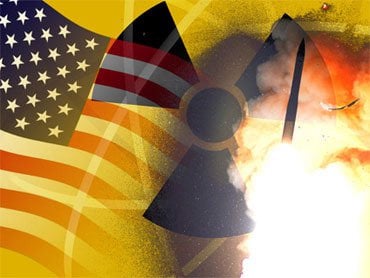
Through an endless barrage of ugly propaganda, the U.S. government and the mainstream American press have put the world on course for a potential nuclear showdown with Russia, an existential risk that has been undertaken cavalierly amid bizarre expressions of self-righteousness from Western institutions.
This extraordinarily dangerous moment reflects the insistence of the Establishment in Washington that it should continue to rule the world and that it will not broach the possibility of other nations asserting their own national interests even in their own neighborhoods.
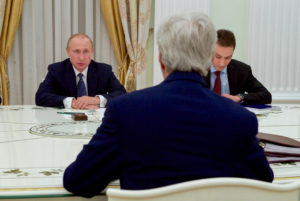
U.S. Secretary of State John Kerry listens to Russian President Vladimir Putin in a meeting room at the Kremlin in Moscow, Russia, at the outset of a bilateral meeting on July 14, 2016. [State Department Photo]
While that may not be the intention of President Obama, who in his recent United Nations address acknowledged the risks from imposing uni-polar order on the world, a powerful bureaucratic machinery is in place to advance U.S. propaganda goals. It is operating on a crazed auto-pilot hurtling toward destruction but beyond anyone’s ability to turn it off.
This machinery consists not just of outlets and activists funded by U.S. tax dollars via the National Endowment for Democracy or the U.S. Agency for International Development or NATO’s Strategic Communications Command, but like-minded “human rights” entities paid for by billionaire currency speculator George Soros or controlled by neoconservative ideologues who now run major U.S. newspapers, such as The Washington Post and The New York Times.
This propaganda apparatus now has so many specialized features that you get supposedly “progressive” and “anti-war” organizations promoting a major U.S. invasion of Syria under the guise of sweet-sounding policies like “no-fly zones” and “safe zones,” the same euphemisms that were used as the gateway to bloody “regime change” wars in Iraq and Libya.
There exists what intelligence veterans call a Mighty Wurlitzer, an organ with so many keys and pedals that it’s hard to know where all the sounds come from that make up the powerful harmony, all building to the same crescendo. But that crescendo may now be war with nuclear-armed Russia, which finds in all this demonizing the prelude to either a destabilization campaign aimed at “regime change” in Moscow or outright war.
Yet, the West can’t seem to muster the sanity or the honesty to begin toning down or even showing skepticism toward the escalating charges aimed at Russia. We saw similar patterns in the run-up to war in Iraq in 2002-2003 and in justifying the ouster, torture and murder of Libya’s Muammar Gaddafi in 2011.
Western propaganda also has enveloped the conflict in Syria to such an extent that the American people don’t understand that the U.S. government and its regional “allies” have been supporting and arming jihadist groups fighting under the command of Al Qaeda and even the Islamic State. The propaganda has focused on demonizing Syrian President Bashar al-Assad, while downplaying or ignoring the real nature of the “moderate” opposition.
Taking Aim at Putin
In many ways, the Western insistence on “regime change” in Syria ties in directly to the extraordinary escalation of that strategy to seek “regime change” in Russia. In August-September 2013, America’s neocons and liberal war hawks were salivating over the prospect of a U.S. military bombing campaign to devastate Assad’s army as punishment for his alleged role in a sarin gas attack outside Damascus.

U.S. Secretary of State John Kerry, flanked by Assistant Secretary of State for European and Eurasian Affairs Victoria “Toria” Nuland, addresses Russian President Vladimir Putin in a meeting room at the Kremlin in Moscow, Russia, at the outset of a bilateral meeting on July 14, 2016. [State Department Photo]
At the last minute, however, President Obama listened to the doubts from his intelligence advisers and rejected what he later called the Washington “playbook” of a military response to a complex problem. To the annoyance of Washington insiders, Obama then collaborated with President Putin in a diplomatic settlement in which Syria surrendered all its chemical weapons while still denying any role in the sarin attack. Obama was accused of weakness for not “enforcing his red line” against chemical weapons use.
The despair over Obama’s failure to bomb the Syrian government and open the path for a long-desired “regime change” in Damascus led to a search for other villains, the most obvious one being Putin, who then became the focus of neocon determination to make him share their pain and disappointment.
National Endowment for Democracy President Carl Gershman took to the op-ed page of The Washington Post in late September 2013 to declare that Ukraine was now “the biggest prize” and represented an important interim step toward eventually toppling Putin in Russia.
Gershman, who is essentially a neocon paymaster dispensing $100 million a year in U.S. taxpayers’ money to activists, journalists and various other operatives, wrote: “Russians, too, face a choice, and Putin may find himself on the losing end not just in the near abroad but within Russia itself.”
Within weeks, U.S. neocons – including Assistant Secretary of State for European Affairs Victoria Nuland and Sen. John McCain – were encouraging right-wing Ukrainian nationalists to overthrow Ukraine’s elected President Viktor Yanukovych, a coup accomplished on Feb. 22, 2014, touching off a civil war between Ukraine’s west and east.
As part of that Western propaganda barrage, the Ukraine coup ousting the elected president was hailed as a victory for “democracy” and Yanukovych’s supporters in the south and east who resisted this imposition of illegitimate authority in Kiev became the target of a U.S.-backed “Anti-Terrorism Operation” or ATO.
Led by The New York Times and The Washington Post, the Western media fell in line behind the preferred narrative that there was “no coup,” that there were “no neo-Nazis” spearheading the non-coup (or maybe just a few), that the “Heavenly Hundred” who died in the putsch against Yanukovych had given their lives for Ukraine’s “freedom” even though some of the “heavenly” inconveniently were neo-Nazi street fighters, part of a paramilitary force that had killed some 16 police officers.
Killing ‘Terrorists’
Given the West’s pro-coup propaganda themes, it became necessary to justify the thousands of eastern Ukrainians slaughtered in the ATO as the killing of “terrorists” or Russian “stooges,” getting what they deserved. The 96 percent vote in Crimea’s referendum to reunify with Russia had to be a “sham” since the West’s narrative held that the Ukrainian people were thrilled with the putsch, so the Crimeans must have voted that way at Russian gunpoint.
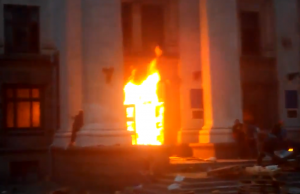
Screen shot of the fatal fire in Odessa, Ukraine, on May 2, 2014, killing scores of ethnic Russians trapped inside. (From RT video)
The explanation of Crimea’s secession from Ukraine was that Russia “invaded” and “annexed” Crimea although there were no images of an invasion (no tanks crossing Crimea’s borders, no amphibious landings, no paratroopers descending from the sky – because Russian troops were already in Crimea as part of a basing agreement and helped protect Crimea’s inhabitants so they could hold their vote which did represent their desires).
Because the Western propaganda insisted that the new authorities in Kiev were wearing white hats, the Russians had to be fitted with black hats. Every bad thing that happened was automatically Putin’s fault. So, when Malaysia Airlines Flight 17 was shot down over eastern Ukraine on July 17, 2014, the West’s propaganda machinery whirred into action, blaming Russia for supposedly giving the ethnic Russian rebels powerful Buk anti-aircraft missiles.
The propaganda momentum was so strong by then that there was no Western support for Russia’s request for a United Nations investigation. Instead the inquiry was largely turned over to the torture-implicated Ukrainian intelligence service, the SBU, upon which the Dutch and Australians, the other two principal members, became increasingly dependent (by their own admissions). Belgium and Malaysia played lesser roles.
The Joint Investigation Committee (JIT) considered no serious alternatives to the Russians and the rebels being responsible. For instance, when the JIT released its “report” on Sept. 28, 2016, there was no explanation offered for why Dutch intelligence (i.e. NATO intelligence) had concluded that the only missile systems in eastern Ukraine on July 17, 2014, capable of shooting down MH-17 were controlled by the Ukrainian military. The JIT “report” was silent about where those Ukrainian Buk missile systems were at the time of the shoot-down.
It’s also a bit of a misnomer to describe the JIT’s findings as a “report” since they were really expressed in a series of videos featuring computer-generated graphics supposedly showing a Russian Buk crew driving around Ukraine, mixed in with a few photos from social media of a Buk convoy.
Key to the JIT’s findings were phone intercepts provided by the SBU and assembled to reinforce the impression of Russian guilt. The problem, however, was that except for one intercept in which someone said he’d like to have Buks, the word “Buk” is not mentioned; nor the word “missiles”; nor the word “aircraft”; nor any discussion about shooting down a plane. That was all supposition with an authoritative narrator filling in the gaps.
Ignoring Contrary Evidence
The JIT also ignored evidence that contradicted its conclusions, such as other intercepts reporting that a Ukrainian convoy had penetrated close to the eastern city of Luhansk. The significance of that revelation is that it confirms a point that has been largely ignored, that the Ukrainian military could move almost at will across “rebel-controlled territory.” The notion that the Ukrainian civil war was like World War I with fixed trench lines was simply a fallacy.
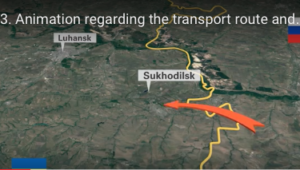
Screen shot from the Joint Investigation Team’s video report citing where a Russian Buk missile battery allegedly crossed into eastern Ukraine.
The JIT also had to impose a bizarre route for the Russian Buk battery to follow on its way to the supposed firing location south of the remote eastern town of Snizhne. Because the “social media” photos show the Buk convoy heading east toward Russia, not west from Russia, the JIT had to map out a journey that ignored a simple, direct and discreet route from the Russian border to Snizhhe in favor of a trip more than twice as long roaming around eastern Ukraine all the way to Donetsk before turning eastward past a number of heavily populated areas where the Buk convoy, supposedly on a highly secret mission, could be photographed.
The alleged firing location also conflicts with the alleged reason for the Russians taking the extraordinary risk of introducing a Buk system – that it was needed to defend rebel soldiers then fighting mostly in the north against Ukrainian troops and aircraft. For that purpose, the positioning of a Buk battery far to the southeast makes little sense, nor does the decision for a Russian Buk crew to shoot down a commercial airliner flying at 33,000 feet.
JIT’s account of the post-crash exfiltration of the Buk convoy back to Russia also is curious, since again the shortest, easiest and least populated route was ignored in favor of one that went far to the north past Luhansk, the alleged site of the supposed “getaway” video (although the supposed location of the “getaway” video was misplaced by Western media groups trying to pin the blame on Russia).
The confirmed parts of the Buk convoy’s route, i.e., along highways east of Donetsk, would fit better with a scenario that, I’m told, received serious consideration from U.S. intelligence analysts, that a Ukrainian Buk system under the control of a rogue military unit loyal to a fiercely anti-Putin oligarch traveled east into what was considered “rebel-controlled territory” to fire on what was hoped to be Putin’s official plane returning from a state visit to South America, i.e. to kill Putin.
A source briefed by these analysts said the missile was fired despite the unit’s doubt that the plane was Putin’s. Although it’s unclear to me exactly what the U.S. intelligence consensus ultimately turned out to be on MH-17 (since I have been refused official updates), there would be logic in a Ukrainian hardliner staging such an audacious missile attack deep inside “rebel territory,” since any assassination of Putin would have to be explained as an accidental attack by his own allies, i.e., the ultimate case of Putin being hoisted on his own petard.
To evaluate which scenario makes more sense – that the Russians dispatched a Buk missile battery on a wild ride across eastern Ukraine or that a Ukrainian Buk battery penetrated into supposedly rebel-controlled territory with the intent of attacking a civilian plane (although not MH-17) – it would be crucial to have an explanation of where the Ukrainian Buk batteries were located on July 17, 2014.
Silence on Dutch Intelligence
Some of the Russia-did-it crowd have dismissed claims that Ukrainian Buk systems were in the area as Russian disinformation, but their presence was confirmed by a report from the Dutch intelligence service, MIVD, relying on NATO information to explain why commercial airliners were still being allowed over the war zone.
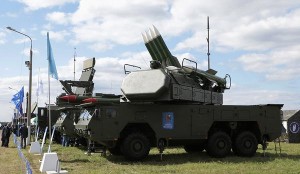
A photograph of a Russian BUK missile system that U.S. Ambassador to Ukraine Geoffrey Pyatt published on Twitter in support of a claim about Russia placing BUK missiles in eastern Ukraine, except that the image appears to be an AP photo taken at an air show near Moscow two years earlier.
The MIVD’s explanation was that the only anti-aircraft missiles that could hit a plane at 33,000 feet were controlled by Ukraine, which was presumed to have no interest in attacking commercial aircraft, and that the rebels lacked any missile system that could reach that high. Clearly, there was an intelligence failure because either some Ukrainian Buk operators did have an intent to strike a civilian plane or the rebels did have a Buk system in the area.
If the JIT were operating objectively, it would have included something about this intelligence failure, either by showing that it had investigated the possibility that Ukrainian Buk missiles were used by a rogue unit or explaining how Western intelligence could have missed Russia’s introduction of a Buk system into eastern Ukraine.
Instead, there was just this video that includes cryptic phone intercepts, assertions about unnamed witnesses and computer-generated graphics “showing” the movement of a Russian Buk convoy along darkened roads in Ukraine.
Despite the unusual nature of this “indictment,” it was widely accepted in Western media as the final proof of Russian perfidy. The evidence was called “overwhelming” and “conclusive.”
Rather than treating the video report as a prosecutor’s brief – a set of allegations yet to be proved – Western journalists accepted it as flat fact, much as they did Secretary of State Colin Powell’s similar presentation on Feb. 5, 2003, “proving” that Iraq was hiding weapons of mass destruction. (Powell also used computer-generated images — of Iraq’s “mobile chemical weapons labs” that, in reality, didn’t exist.)
The day after the JIT video report was issued, The New York Times’ lead editorial was headlined, “Mr. Putin’s Outlaw State.” It read:
“President Vladimir Putin is fast turning Russia into an outlaw nation. As one of five permanent members of the United Nations Security Council, his country shares a special responsibility to uphold international law. Yet, his behavior in Ukraine and Syria violates not only the rules intended to promote peace instead of conflict, but also common human decency.
“This bitter truth was driven home twice on Wednesday [Sept. 28]. An investigative team led by the Netherlands concluded that the surface-to-air missile system that shot down a Malaysia Airlines plane over Ukraine in July 2014, killing 298 on board, was sent from Russia to Russian-backed separatists and returned to Russia the same night. …
“Russia has tried hard to pin the blame for the airline crash on Ukraine. But the new report, produced by prosecutors from the Netherlands, Australia, Belgium, Malaysia and Ukraine, confirms earlier findings. It uses strict standards of evidence and meticulously documents not only the deployment of the Russian missile system that caused the disaster but also Moscow’s continuing cover-up. …
“President Obama has long refused to approve direct military intervention in Syria. And Mr. Putin may be assuming that Mr. Obama is unlikely to confront Russia in his final months and with an American election season in full swing. But with the rebel stronghold in Aleppo under threat of falling to the government, administration officials said that such a response is again under consideration.
“Mr. Putin fancies himself a man on a mission to restore Russia to greatness. Russia could indeed be a great force for good. Yet his unconscionable behavior — butchering civilians in Syria and Ukraine, annexing Crimea, computer-hacking American government agencies, crushing dissent at home — suggests that the furthest thing from his mind is becoming a constructive partner in the search for peace.”
Rich Irony
Granted, there is some rich irony in a major U.S. newspaper, which helped justify illegal aggression against Iraq with false reporting about Iraq buying aluminum tubes for nuclear centrifuges, pontificating about international law.

Former New York Times reporter Judith Miller, who co-authored the Times’ bogus story about Iraq buying aluminum tubes for nuclear centrifuges.
Indeed, the very idea that any serious person in the United States would lecture other countries about international law would be laughable if the hypocrisy were not delivered in such a serious set of circumstances. For decades now, the United States has been a law onto itself, deciding which countries should be bombed and who should be assassinated.
President Obama himself has acknowledged authorizing military strikes in seven countries during his presidency and many of those attacks were done outside international law. Indeed, the Times editorial appears to urge Obama to launch illegal military strikes against the Syrian government and, not surprisingly, doesn’t mention the U.S. airstrike that killed some 62 Syrian government soldiers just last month, delivering a death blow to the partial ceasefire.
Instead, you get a medley of the Times’ greatest anti-Russian propaganda hits while ignoring the U.S. role in destabilizing and overthrowing Ukraine’s elected government in favor of a harshly anti-Russian nationalist regime that then began slaughtering thousands of ethnic Russians who resisted the coup.
Nor does the Times mention that Russia is operating inside Syria by invitation of the sovereign government, while the U.S. has no such authority. And the Times leaves out how the U.S. government and its allies have covertly armed and funded jihadist rebels who have inflicted many of the hundreds of thousands of dead in Syria. Not everyone, including Syrian soldiers, was killed by Assad and the Russians, although that’s the impression the Times leaves.
A more nuanced account would reflect this murky reality in which sophisticated U.S. weapons, such as TOW missiles, have ended up in the possession of Al Qaeda’s Syrian affiliate and its jihadist allies. It would acknowledge that many sides are at fault for these tragedies in Syria and Ukraine – not to mention all the bloodshed that has followed the U.S.-led and U.S.-enabled wars that have torn apart the Middle East over the past decade and a half.
The Times might also admit that Putin was helpful in resolving the 2013 sarin crisis in Syria and achieving a breakthrough on the Iran nuclear talks in 2014. But that would not fit the propaganda need to demonize Putin and ready the American people for another, even more terrifying “regime change,” this time in Moscow.
What we can now expect are a series of legal actions brought against Russia in connection with the MH-17 case and other controversies. The goal will be to further demonize Putin and to destabilize Russia, a process already underway with economic sanctions that have helped throw Russia’s economy into recession.
The neocon plan is to ratchet up tensions and pain so Putin’s elected government will somehow collapse with the neocons hoping that some U.S. lackey will take over and allow another round of “shock therapy,” i.e. the plunder of Russia’s resources to the benefit of a few favored oligarchs and their American consultants.
However, given the dreadful experience that the average Russian faced from the earlier round of “shock therapy” in the 1990s – including a stunning decline in life expectancy – the more likely outcome from even a successful neocon scheme of “regime change” would be the emergence of a much more hard-line Russian nationalist than Putin.
Whereas Putin is a calculating and rational leader, the guy who follows him might well be an ideologue ready to use nuclear weapons to protect Mother Russia’s honor. After all, it’s not as if one of these neocon “regime change” calculations has ever gone wrong before.
Yet, whichever way things go, Official Washington – and its complicit mainstream media – now appear determined to push Russia into a corner with military encroachments from NATO on Russia’s borders and with criminal accusations before biased international “investigations.” Any misstep in this dangerous game could quickly end life as we know it.
Investigative reporter Robert Parry broke many of the Iran-Contra stories for The Associated Press and Newsweek in the 1980s. You can buy his latest book, America’s Stolen Narrative, either in print here or as an e-book (from Amazon and barnesandnoble.com).

